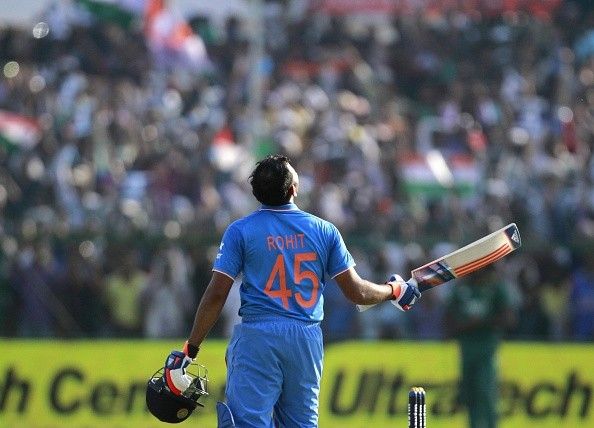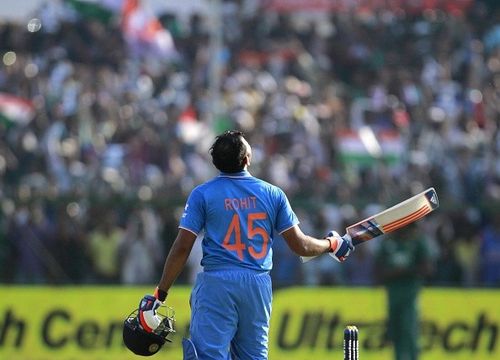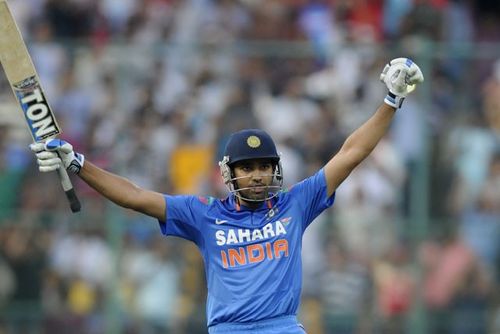
Is Rohit Sharma slowly becoming India's best ODI batsman?

It's a cold January morning in Mohali. The year is 2013. India are playing England. It's another one of those meaningless ODI's that would be forgotten almost as soon as the next one begins.
As usual, the Indian team is in a crisis of some sort. This time, it's in desperate need of an ODI opener who scores some runs. In the past two series, they have tried three, all of whom have failed. Virender Sehwag has just played his last ODI. Ajinkya Rahane will not play another one until the end of the year. The match after this one will be Gautam Gambhir's last.
India has the Test match sensation Cheteshwar Pujara in the team, but decide not to play him. Instead, a certain Rohit Gurunath Sharma has been asked to open, after failing miserably in the middle order for almost the entire part of 2012.
It's a strange selection, but then MS Dhoni is known to make strange selections. Or 'gambles', as some like to call them.
Strange as the selection is, it proves to be a good one. Batting second on a green seamer-friendly wicket, under overcast conditions, Rohit scores a majestic 83. It's lazy, it's elegant, it's beautiful. It's what he does on his day - score pretty runs.
He bats without a care in the world. He bats as if no one thinks he is completely undeserving of a place in the team. He bats as if he didn't average 2.4 the last time he played a five-match series. He bats as if he is in the form of his life. When he bats, none of these things are going on his mind. There is a sense of peace and calm. In Mohali, he bats in a trance.
At the end of the match, when commentators sit down to analyse the match, the question of Rohit being India's regular ODI opener is raised. The answer is unanimous. All of them and others as well believe that Rohit is extremely capable but this innings, like many others, could be a flash in the pan.
It's too early to judge. Even though they don't say it, they expect him to disappoint them again. This time, he doesn't. On 23 January 2013, Rohit Sharma, the Indian ODI opener is born. And until now, he hasn't looked back.
Rohit follows that 83 with a consistent Champions Trophy campaign, partnering well with the flamboyant Shikhar Dhawan. He scores his first ODI century in three years against Australia at home. And then comes a career defining innings, a stroke-filled double century in the series decider. Rohit has now firmly establishing himself as one of the world's best ODI openers.
He has come a long way in the space of a year, but he's still not as consistent as he would like. Those big scores are followed by some low ones. It's better than before, but his run-scoring can certainly improve.
Maybe, he needs a push, like the one he got when he was dropped in late 2012, to further improve his consistency. In the middle of 2014, he gets that push. Through a combination of injury and Ajinkya Rahane's form.
A broken finger, followed by a shoulder niggle makes Rohit miss 9 ODI's. Rahane opens in his absence and scores a lot of runs, including two centuries. With Shikhar Dhawan also scoring prolifically, the popular opinion seems to be that Rohit should be played in the middle order. He seems to disagree and clearly states in an interview that he wants to open the batting.
On 13 November 2014, Rohit, making a comeback, walks out to open the batting, with Rahane alongside him. With Dhawan having sealed his place, this is the final chance for both Rahane and Rohit to get the batting position they want.
This time, that air of detachment is missing from Rohit's face. He knows what is at stake here. A spot at the top of the order in the World Cup. He wants it badly. He knows how much a World Cup snub hurts. He's determined not to let it happen this time. It doesn't.
Rohit plays an innings that redefines ODI batting. Rohit plays an innings that defies all sense, logic and reality. Rohit scores 264 and stamps his name all across the opener's slot. Rohit does what only Rohit can do. Be absolutely unreal.
While this innings rewrites all record books and ensures his place in the World Cup team, it's not his best one. A flawless 138 against Australia at Melbourne in the triangular series in early 2015 and a restrained, not so flamboyant, under pressure 137 against Bangladesh in the World Cup quarter-final are much more importance, are much more valuable.
Despite this impressive tally of hundreds he has accumulated, criticism doesn't seem to stop. Rohit can only score runs on flat wickets, Rohit can only score runs when there's no pressure. Rohit gets out whenever the team needs runs. Rohit is not reliable.
Rohit this. Rohit that. It just doesn't stop.
A magnificent 150 against South Africa at Kanpur did little to change that. But it was the most perfect representation of Rohit's importance in the current ODI team.
Virat Kohli scored 11. People were ripping him apart, taking digs at his personal life and attitude.
MS Dhoni scratched around for 31. People were asking for his head - and his retirement - after this innings.
Rohit Sharma scored 150. People didn't say anything. It seems Rohit's success is slowly dawning on them.
India lost. Unlike ever before, the moment where the match was lost was not when Virat Kohli or MS Dhoni got out. It was when Rohit Sharma got out, just as the match was slipping into India's lap.
For the entire year now, when their two best ODI batsmen in Kohli and Dhoni, have not been at their best, it's Rohit who has often held fort for India. It's Rohit who has scored important runs for India. It's Rohit who has been the most consistent.
At this stage, with Kohli and Dhoni significantly out of touch, Rohit is probably India's best ODI batsman.
For carrying India in tough times, for helping India save the blushes, for everything, India has that strange selection to thank. India has that serene 83 run knock to thank. India has 23 January 2013 to thank. India has Rohit Sharma to thank.
